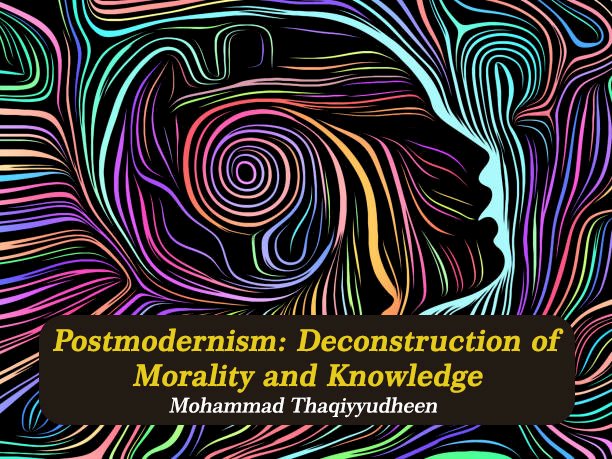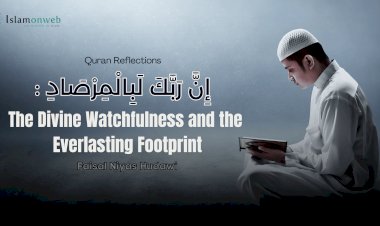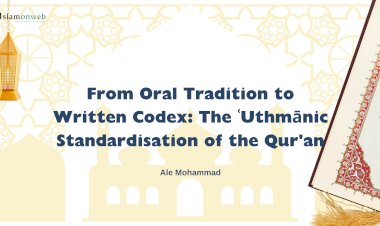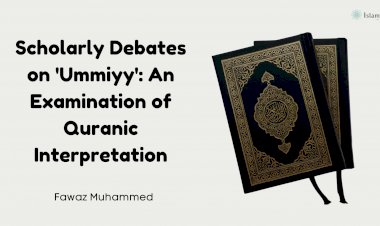Postmodernism: Deconstruction of Morality and Knowledge
The emergence of postmodernism was mainly focused on the deconstruction of the philosophical framework that modernism had contributed to the world, through which it disregards the conventional thinking ways and dismounts the universal validity of the current epistemological understandings and the capacity of a number of currently reliable ideologies on taking us to the ultimate truth. Many thinkers suggest that postmodernism is merely a self-reflection of modernity in the ideological evolutionary chain. Regardless of the claim that postmodernism is a updated version of modernism, in fact, it cannot actually provide more than a social turmoil and cognitive apocalypse to the ideological world. And those who embrace it, backed up with so-called ‘philosophers’ and thinkers, and attempt an ideological adventure would eventually end up on the greatest battlefield in the thinking world, into a butcher house where every field of knowledge would be genealogically tied to a conclusion of social construction.
It is impossible, by the way, to completely deny the systematic approach of postmodernism in claiming that modernism is something that cannot be relied upon or its authority should be questioned because the notion of logocentrism and scientific authority, which are the primary concerns of modernism, has been rejected from a very long time through Kantianism and skepticism. So, contemporary thinkers are in a content quest for that invisible thread between what we see and untruth, between modernism and postmodernism. Nevertheless, in a future not so far, postmodernism as well as post structuralism are going to dominate the collective thinking methods of the world, killing the present understandings of knowledge and metaphysical narrations. At this point of time, it is necessary to understand what the Islamic ideology has to say about postmodernism. In the trends of quoting philosophers and using sophisticated terminologies while discussing philosophy, the fundamental objective of philosophy to think and understand is often missed. Therefore this work would attempt to provoke more thoughts and ideas rather than contribute more ‘words’ to your philosophical dictionary.
Islam has a glorious ideology of divine revelation and interventions. The path to the ultimate truth is already woven, where the diversity of thoughts is not required, unlike secular philosophical ventures. But, regardless of this ideological determinism, what makes the Islamic ideology more profound is its relevance and universal applicability throughout time. Therefore, Islam does not really need to adapt to any philosophical trends but can instead confirm if it’s reliable in reaching the truth or not. And as it is clear, Islam holds a critical stance against modernism and postmodernism. Still, concern arises around the invasion of postmodernism and post-postmodernism in the Muslim academic world, and realizing this concern is the only way to secure the holy path towards the ultimate truth.
“Postmodernism murders its own master – Ihab Hassan”. Defining postmodernism without a sight reliance on modernistic views is improbable. As it is stated, postmodernism is a reformed self-reflection of modernism. Modernism holds that logic, more like Marxism and Hegelianism, is an ultimate liberatory force of humankind towards good and truth, and it was through Kant, Rousseau and Francis Bacon that this notion was popularized. But, on the contrary, postmodernism argues that logic is neither pure nor completely reliable, it is mere mental calculations and conclusions of our empirical understandings of the perceptual world. So, as long as empiricism cannot be completely approved as reliable and true, we cannot rely on logic. This notion demolishes all the branches of knowledge that are based upon logic and rational basis, this is how postmodernism proves the irrationality of logocentrism. Even though most thinkers reject this paradoxical explanation that logic is logically false, we cannot turn a blind eye towards the fact that the logic presented by modernity actually does lead to an unreliable conclusion. On the other hand, Islam represents rationality as a divine gift to humankind. Islamic ideology recognizes rationality (‘ȧql) as one of the three essential elements of epistemology, therefore rejecting rationality would result in rejecting the Islamic texts and logic (mantiq) as well. The role played by logical investigation in deriving Islamic values and jurisprudential laws from the scriptures is undeniable.
Contrary to the conventional metaphysical viewpoints, postmodernism argues that there is no independent external reality outside our mind, where all the ‘universal’ truths are fundamentally unstable. By simply denying the existence of an objective reality and presenting a notion of subjective or naïve reality, postmodernism has successfully murdered all the lifetime efforts of the current ideological and scientific values. These realities that have lost their self-identity later turn into mere symbols and manifestations of aesthetics and beauty, putting a cold shoulder on the pragmatic consequences of it. It is thereupon observed that at last a cognitive turmoil or a logical disability is the master plan that postmodernism is trying to offer. “The existence of things is established” is the essential standpoint of Islam in almost all of the theological textbooks. Islamic theology, with its strict ideology of divine existence, rejects the fundamental idea of this postmodern notion. Postmodernists rather present a poetic question of skepticism, why can’t all these be mere dreams in confronting the objectivity of modernism? While the master advocates of skepticism like Rene Descartes later came up with an objective conclusion of “therefore I am”, postmodern skepticism moves further rejecting the author of the thoughts and his consciousness altogether, stating that recognizing the conscious existence is a personal choice. Islam says that tying the existence of things to one’s own imagination and choices is the same as denying existence as a whole.

Postmodernism disagrees with the modernist notion of science and history that these are in a constant linear evolutionary journey towards development and betterment. Postmodernism advocates for the independence of the events, where each event changes the world as a whole. Therefore it is not probable to compare two events in the course of history. This would destroy the truth value of science and history. It is through this analysis that postmodernism neglects all the metanarratives, like dialectical materialism, in explaining the world events. They move forward to argue that the world order is much more complicated than to be explained by a single narrative. Therefore, it is ridiculous to conclude that modernity is the most profound ideology ever to exist. Likewise, Islam does not necessarily attribute truth to the scientific expedition either. “To be coherent with reality” is the primary definition of truth given by traditional Islamic texts. There have been attempts by contemporary thinkers in recent times to confirm the authority of the Qur’an and Islamic values using modern science, forgetting the fact that science can never have a universal truth value. A thing cannot be true just because science said so.
In the case of morality and ethics, postmodernism accounts for them as a mere construction of societal imagination and relativistic dogmas throughout the history of humankind. Frederic Nietzsche confirms this theory in his work “On the Genealogy of Morality”, regarding it as the construction designed to gain power. Therefore, gender identity and discrimination were actually practiced by ancient human societies to meet up their reproductive measures, in the current situations of overpopulation and population control strategies the moral framework of gender identity loses its shape and becomes irrelevant, so as postmodern feminists put it, we need a world order of non-genderism. They warn us that we should not be deceived in the ‘morality of the majority’ of modern times but rather embrace an ideology of trans-identity, as in music and spirituality, where everyone is what he wants to be. The problem here is that they are either systematically ignoring or desperately ignorant of the pragmatic consequences of their claims towards nihilism and absurdism. Actually, Islamic ideology agrees that human logic alone cannot determine moral values. “There is no rule except for Allah” (Jam’ul Jawami’), the value of good and evil can only be determined by divine revelations and prophetic teachings. So, most Islamic scholars agree that as long as there is no revelation, one cannot be held accounted for his actions in terms of morality. But, this divine morality acts as the categorical imperatives of Kant. In this sense of moral objectivism, Islamic ideology rejects the ‘freedom of corrections’ given by postmodernism.
Postmodernism was actually raised as a cognitive revolution against the conventional ideological framework of the modern world. But, in the end, apart from the deconstruction of morality and knowledge, there was nothing it could offer. It could not even challenge the ideological strength of a thousand years old religion.
References:
Akbar, Ahmed. 1992. Postmodernism and Islam. London: Routledge.
Berlinski, David. 2008. The Devil's Delusion: Atheism and Its Scientific Pretensions. US: Crown Forum.
Hassan, Ihab. 1987. The postmodern turn. California: Ohio State University Press.
University, Oxford. 2007. Oxford Handbook of Continential Philosophy. Oxford: Oxford University Press.
About the author: Mohammad Thaqiyudheen, S/o Abdul Jaleel Hudawi Vengoor. Degree research scholar, Darul Uloom Islamic Da’wa College, Thootha (affiliated to Darul Huda Islamic University, Chemmad). Keen interest in Islamic philosophy and Islamic academics, with an ambition to become a professional writer for Islam. Bagging some notable achievements in Sibaq National Artfest ’22 has inspired me with my future ventures.
Disclaimer
The views expressed in this article are the author’s own and do not necessarily mirror Islamonweb’s editorial stance.

























Leave A Comment